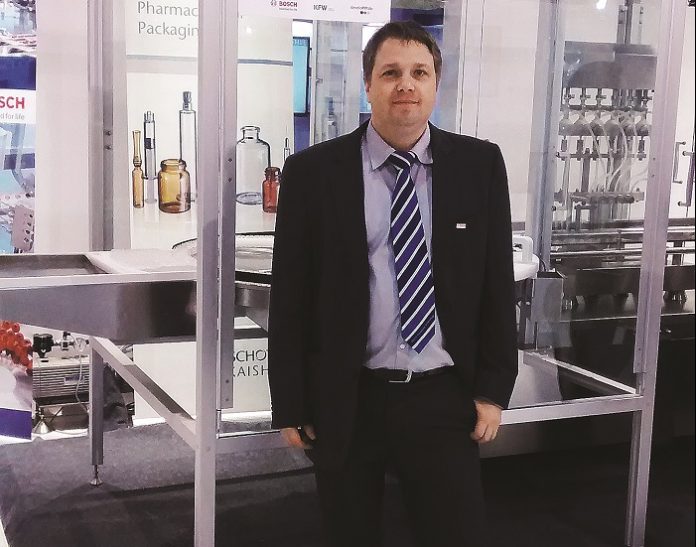
Bosch India had a stellar time at PMEC India 2014, which was held in Mumbai from 2 to 4 December 2014. The company displayed four products including its designed and made in India vial filling and closing machine. The locally made vial filling and closing machine was formally launched at PMEC.
The FLC 3005 filling and closing machine for vials has been designed primarily for the Indian market but other emerging markets are in focus as well. It took almost two years for the Bosch India team to develop the machine in collaboration with a German team the FLC 3005 was made at Bosch’s Goa plant.
Most of the ideas came from the Indian team while the role of the German team was more of a reviewer to make sure there were no mistakes, said Andreas Mattern, business unit head-pharma.
With its processing range with filling volumes from 0.5 to 100 ml, the FLC 3500 is tailored for the most frequently demanded vial sizes. Customers will benefit from short delivery times. The machine’s strictly modular design allows it to be customized to product flows and room conditions. The FLC 3005 is supplied with features like operator-friendly touchscreen and various options like RABS (Restricted Access Barrier Systems), infeed turntable in UDAF design, gas flushing stations, and reject station for defective containers and for sampling.
According to Mattern, the idea behind developing a machine in India was to provide 100% quality to local customers. We realized that for certain segments of the market the German machines tend to be over-engineered. Indian customers are not ready to pay for those extra features. With the made in India for India machine, we have tried to keep the needs of local customers in mind, Mattern explained.
Bosch is upbeat about the prospects of the new machine in India as initial feedback from customers has been very positive. This project needed big investment so if we were not confident about the success of this machine we would not have made such an investment. We expect to sell a good number of machines in India, said Mattern.
Along with the FLC 3500, the other three machines on display were the Solid Lab 1, the GKF 702 capsule filling machine and the TPR 500 tablet press. The GKF 702 has a processing range which includes tablets, powders, pellets and liquids. The machine is equipped with an industrial PC and a touchscreen interface for easy operation. In the laboratory, as well as for R&D use, the GKF 702 can operate under production and laboratory conditions. The TPR 500 tablet press can produce more than 400,000 tablets an hour with standard tooling on a small footprint. The two level production zone ensures total separation of the production and technical areas even when the turret is removed.










